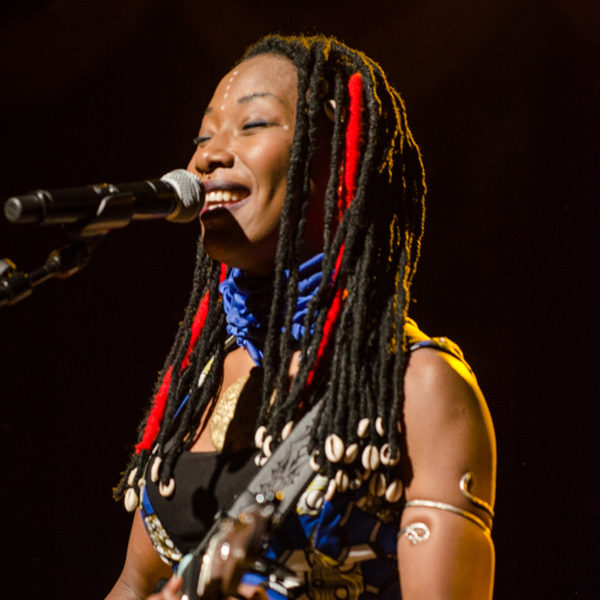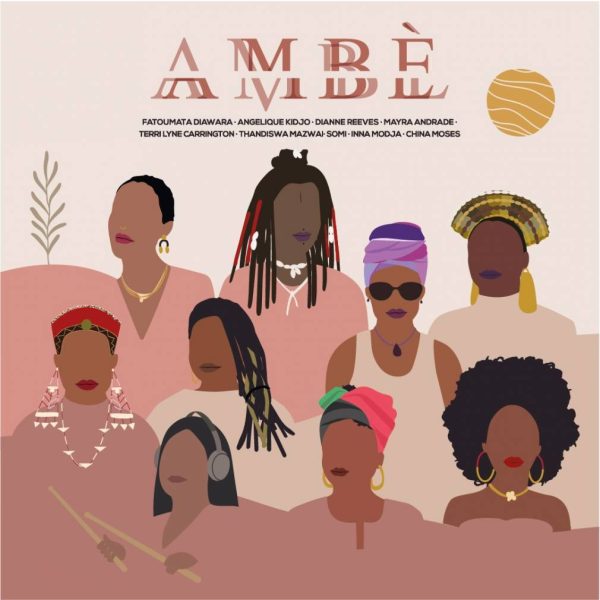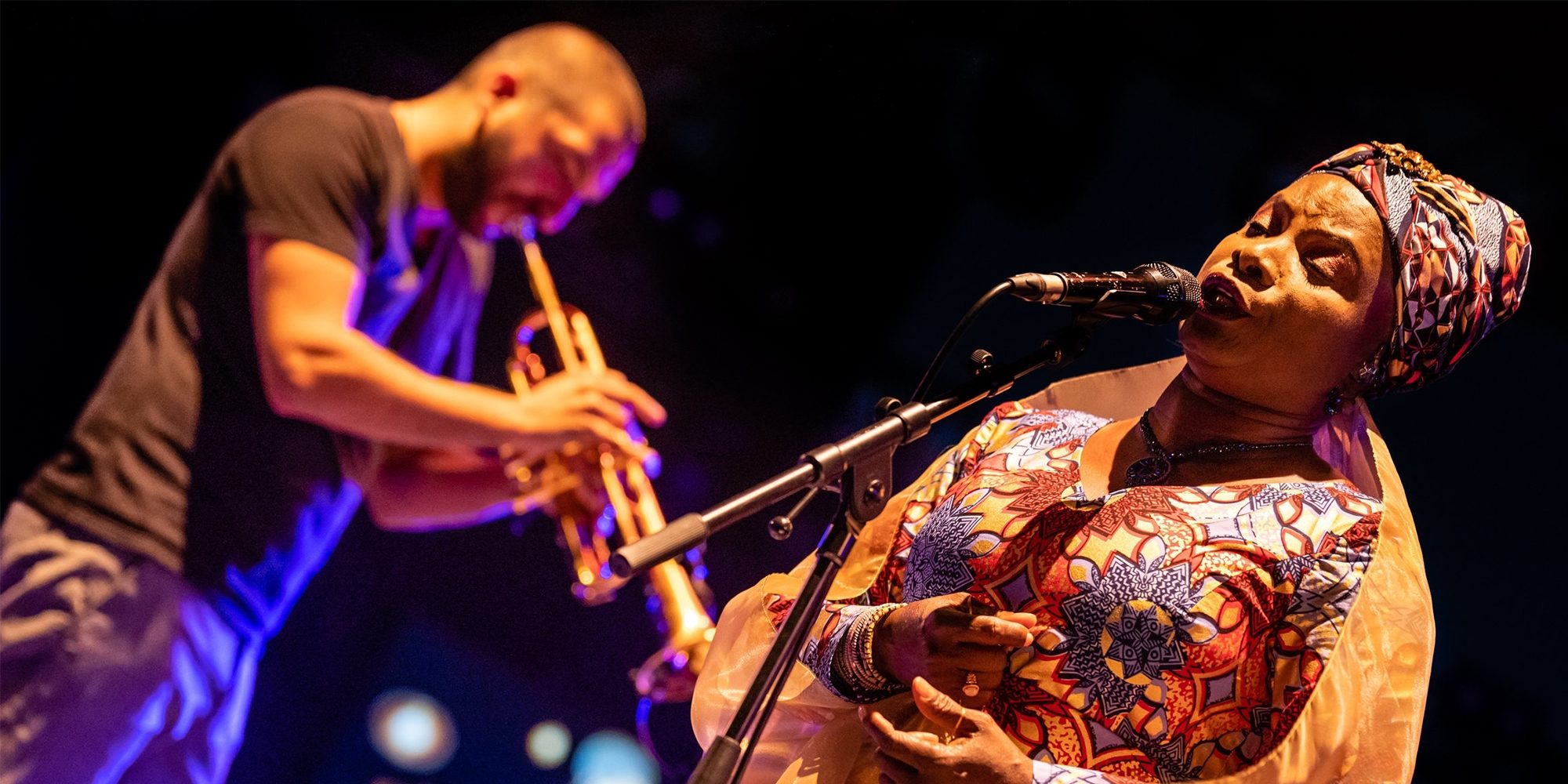Angelique Kidjo never ceases to surprise us. When she performed at Carnegie Hall last November, she was joined by some unexpected guests, including Philip Glass on piano for a hall-of-mirrors take on “Malaika,” and Lebanese jazz trumpetist Ibrahim Maalouf who played an extended solo before being joined by Kidjo and her band. It turns out that last collaboration was more than a Carnegie Hall whim. Kidjo’s connection with Maalouf has a history. In June 2022, fresh off winning her fifth Grammy Award for her 2021 release Mother Nature, she and Maalouf unveiled a remarkable joint project: Queen of Sheba. This is a set of seven tracks, each based on a riddle derived from the rich literature of the Queen of Sheba and her relationship to King Solomon.
Kidjo sings completely in Yoruba, and Maalouf has composed and arranged elaborate musical accompaniments that range from Kidjo-esque Afro-funk to the sort of idiosyncratic, celestial jazz Maalouf is known for. Afropop’s Banning Eyre reached the two artists in their respective Paris homes via Zoom. Kidjo was getting ready to perform Mother Nature at the Spoleto Festival in Italy. Maalouf was celebrating his son’s first birthday. As they waited for Maalouf to join the call, Kidjo was talking activism, chiding progressives to get out “in the streets.” Speaking like a true American, she noted that we sat back and watched the Supreme Court get hijacked, adding, “We can’t afford the luxury of sitting back and complaining.” Here, here!
As the conversation progressed, it became clear that both Kidjo and Maalouf view the Queen of Sheba project as a form of cultural resistance—activism as well as inspirational high art.
Slideshow image by Arthur Viguier
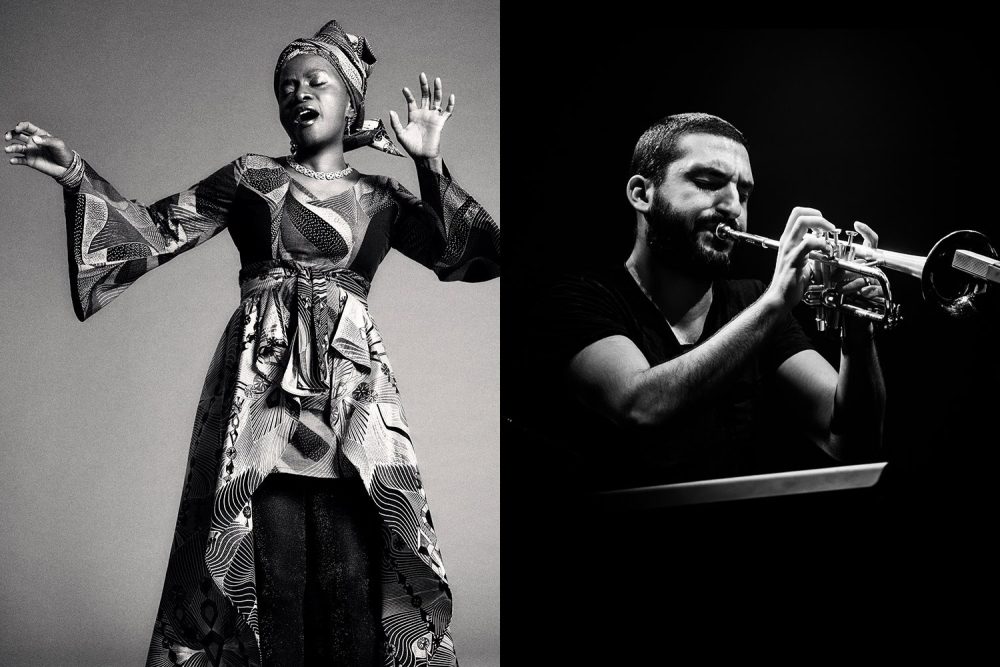
Banning Eyre: Angelique, I have been a fan of Ibrahim Maalouf for a few years, so it was a nice surprise to see him join you on stage at Carnegie Hall. But I had no idea how deep you guys were going with this project. It's a very powerful album. I like it more each time I hear it. But tell me, with all the stories in the world, why did you pick the story of the Queen of Sheba?
Angelique Kidjo: If you look at the state of the world, and you go back to that time, there was a king called Solomon who was the wisest leader in the world. Then you had a queen who was wondering, "How can I lead my people? And if there's a king who is wise, can I tap into that wisdom a little bit and to be able to be a queen that can lead my people to the future?” The story is about riddles that the Queen poses to Solomon, to figure out what it is to be a wise person, and what is the power of Solomon to gather all these people behind him as their leader.
When we started talking about this collaboration, I didn't have the Queen of Sheba in my head. My first preoccupation was: What story are we going to tell? What is the link between the Middle East and Africa? And as I was doing my research, I stumbled on this story. There are so many stories about the Queen of Sheba, or Makeda. There are many names that have been given to her. But today, the story resonates in our crazy world where the wisdom of leading people in peace is dwindling.
I did not expect it was going to turn out like this, but I was interested in a queen with that level of power who would be humble enough to say, "Let me go check on my fellow king. What makes him such a wise person? How can I tap into that knowledge?”
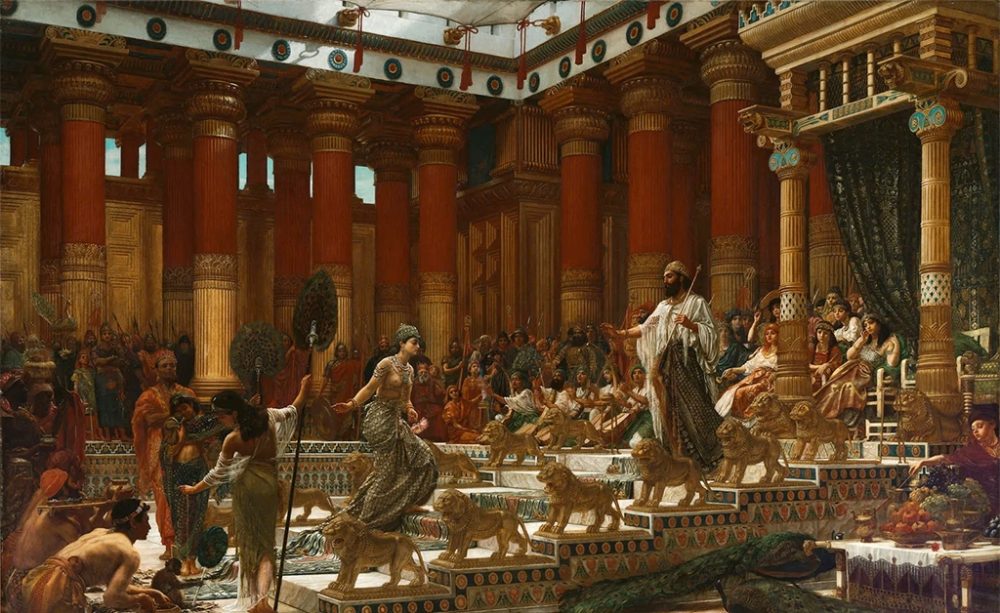
Ibrahim, how did you find your way into this project?
Ibrahim: Well, I had the chance and the honor to meet Angelique eight or nine years ago. She came to a concert I was doing. I think it was in New York. We met and we started talking. I was like, "Wow, Angelique Kidjo came to see my show!” I have loved her music for so long: Her sound, her voice. Suddenly we started talking, and we connect. Angelique said, "We should maybe think about something, something we can work on together." And I said, "Angelique, I would love to work with you. It would be an honor to work with you. What do you want us to work on?” She said, "Give me a few days. I want to think about this and get back to you.”
And then Angelique and Jean called me back and said, "We have this idea where the Middle East and the Arab world meet Africa. There's this beautiful story, this beautiful myth about the Queen of Sheba and King Solomon, and the riddles surrounding the story. It might be really interesting to work on this. What do you think?"
So I did my own research. Angelique and Jean sent me the riddles, with the translations, and texts in Yoruba, and I was wowed. This is genius. This is pure genius. I love this idea definitely, I want to work on it. This is how we started.
Angelique: There are so many riddles. But how do you make an album with riddles? So we said let's choose seven and make seven songs for seven riddles. And the riddles we have chosen are timeless. In my language, in my country, they say "A word is like an egg. Once it has fallen down, you can't piece it back together.” My father would also say, "If you look at your body everything is in twos. Every coin has another face. The only thing that comes alone is the mouth.” Your nose has two holes. Your eyes, your ears, your hands, everything. And that's why that proverb makes so much sense. Your mouth can open doors or close doors. It can put you in danger or make your life better.
That's why I chose the first riddle, “Ahan.” Because the power of King Solomon is that he knows how to talk to his people, how to galvanize his people, how to guide them in the right way. That's why that riddle is there.
Tell me about that first riddle.
O.K., I will read it to you. “Where does that power come from? Is it your hand that bears the sword? Then what part of your body gives you this infinite power over men? And where does that power come from? Is it your foot that rushes to the battlefield? Then what part of your body gives you this infinite power over men?”
That's the riddle. And here is the answer: “Your tongue, Oh, King of Kings. It enthralls the one who listens to you. Your tongue, Oh, King of Kings, has the power of life and death over your people.”
O.K. The tongue. The power of the word.
Then the second one: “This bird has no flesh. This bird has no blood. This bird has no feathers. Its color is as pure and beautiful as gold. This bird might be dead, or it might be a lie. This bird that does not move its color is as virginal and sweet as milk.” And the answer is…
Oh boy. I guess I'm not very good at riddles.
It's an egg. “An egg has no flesh. An egg has no blood. An egg has no feathers. Its color is as pure and beautiful as gold. An egg might be dead or it might be alive. An egg does not move. Its color is as virginal and sweet as milk.” So, you see? The egg gives birth to the bird.
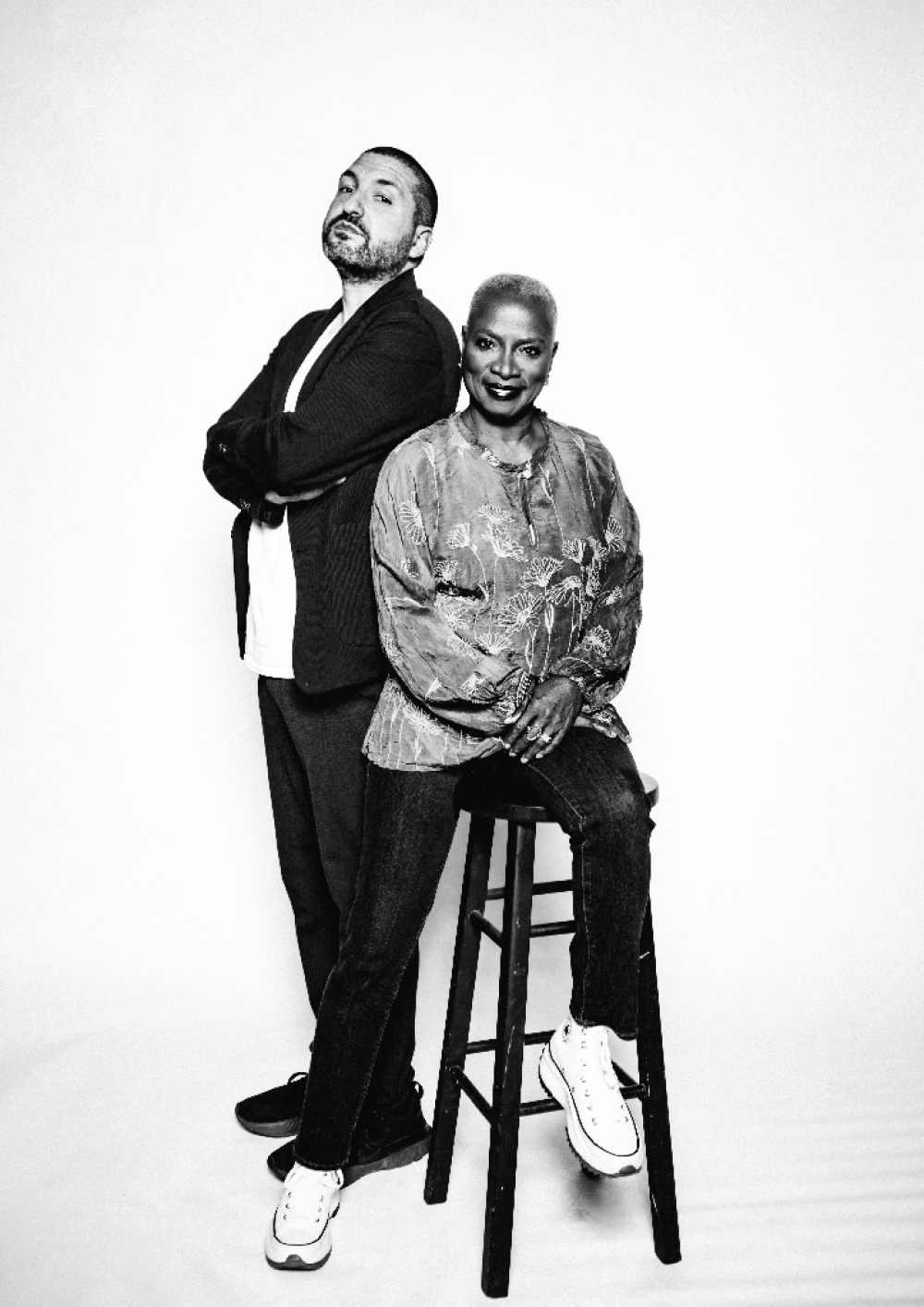
O.K. This is beautiful. So you've picked seven of these riddles. I understand that there are many versions of the Queen of Sheba story. Where do all these riddles come from?
We did a lot of research. How many riddles did we have in the beginning, Ibrahim? Do you remember?
Ibrahim: About 30 of them.
Angelique: Then from that, I started thinking that to have continuity, we need riddles that tell a story. That's how we picked seven out of the ones we had.
O.K. Let's talk about the music, which I find so interesting. There's a lot going on in it, a lot of rhythms, a lot of sonic layers… How did you go about collaborating? What was your process?
Ibrahim: Angelique first sent me the lyrics that she wrote based on most riddles. The texts were already very inspiring in terms of melody and rhythm, but since I don't speak Yoruba, I asked her to record them speaking, so that I would know where the tonal accents are. So she sent me her voice saying the words. Based on those accents, I created melodies and I produced music demos on my computer, making sure that the melodies really respected the accents of the Yoruba text, and the accompaniment with the piano, drums, guitars, bass, sounded approximately the way I wanted things to go.
So you're just roughing this up on your computer at this point, not using actual musicians.
Yes. I needed to be sure that Angelique was very comfortable with the melodies. So I sent them to her, and she sent me back versions where she was actually singing what I was singing in the demos, although obviously much, much, better than what I did. It really sounded right. It was the right range. I knew Angelique's voice so well that I was pretty sure it was her range, but I wanted to be certain. We maybe changed one of the songs. One of them was too low, so we raised it one step higher. But basically, she really respected the music just the way I wrote it, and that meant a lot to me. I had really to compose something that matches her voice and the accents and everything. So based on what Angelique sent me, I brought in the real band, and the chorus, the strings, the drums, the percussion. I did the arrangements based on the knowledge that it matched Angelique’s voice 100 percent.
Then I sent it back to Angelique, and she rerecorded her vocals, a much better version because of the quality of the microphones. Once she recorded her vocals, I finished the process by recording the orchestra and the African percussionists.
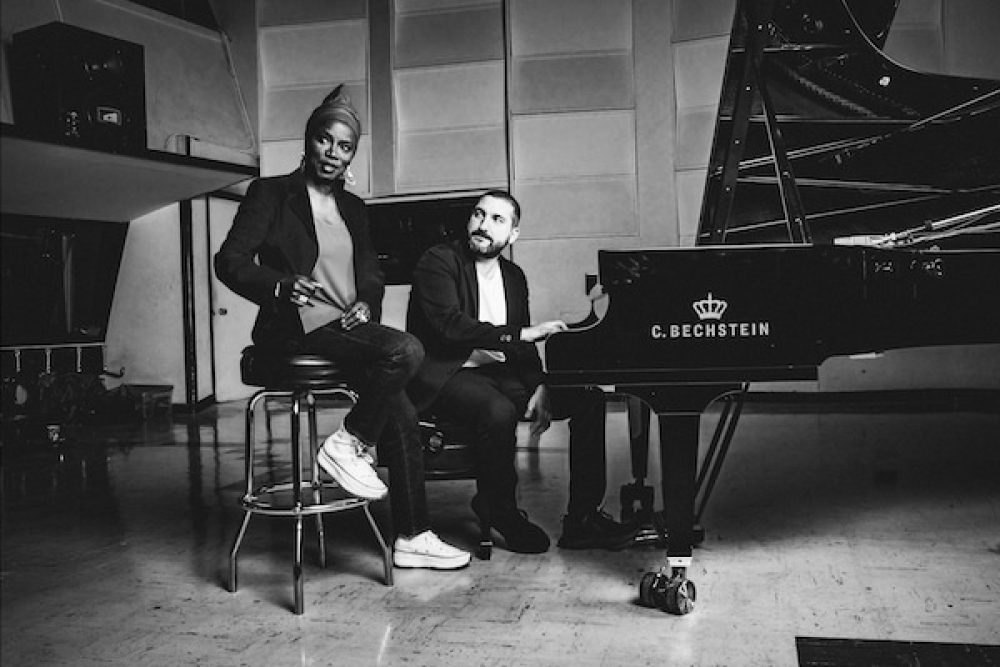
Where did all that happen, the actual recording of the musicians?
The music was recorded over a period of seven years. We started seven years ago.
Really? That long ago. Amazing. It doesn’t sound like something that was done quickly, but I didn't imagine it had taken that long.
Angelique: We started on stage first. The first existence of Queen of Sheba was at Jazz A Vienne, before the pandemic, in 2018.
Ibrahim: But those first demos I did were from 2015, and the last ones were finished in 2017. After that we recorded the real version of the band. Then, six months ago, we recorded the strings as well as the percussion, the trumpets, and the choirs. We recorded a little bit everywhere, mostly in France, but also in L.A., we recorded some things.
But what Angelique says is right. We experienced it first on stage. We played a few concerts with the strings and the percussion and everything, and that helped me finish the arrangements. Sometimes you have something in mind. You like it, but then when you play it it's not quite exactly what you wanted. So I corrected things. I modified some things. The lengths of some of the songs changed.
Also the order. I had another order, and Angelique and Jean said, "You should maybe think about the order.” So we switch things around some. We worked on this for so long. I think that's why everything is so precise, because the process was long. It’s not like we just went in the studio for a few weeks and then mastered it the next month. No. No. It's been a very long process, but I never, never, never got bored. Never. Which is a good sign, because usually I get bored very often and very quickly.
Even now, when I listen to the music, even though I've been working on it for so many years, every time I listen to it, I feel like, "Ah! This is so cool.” I loved working on this.
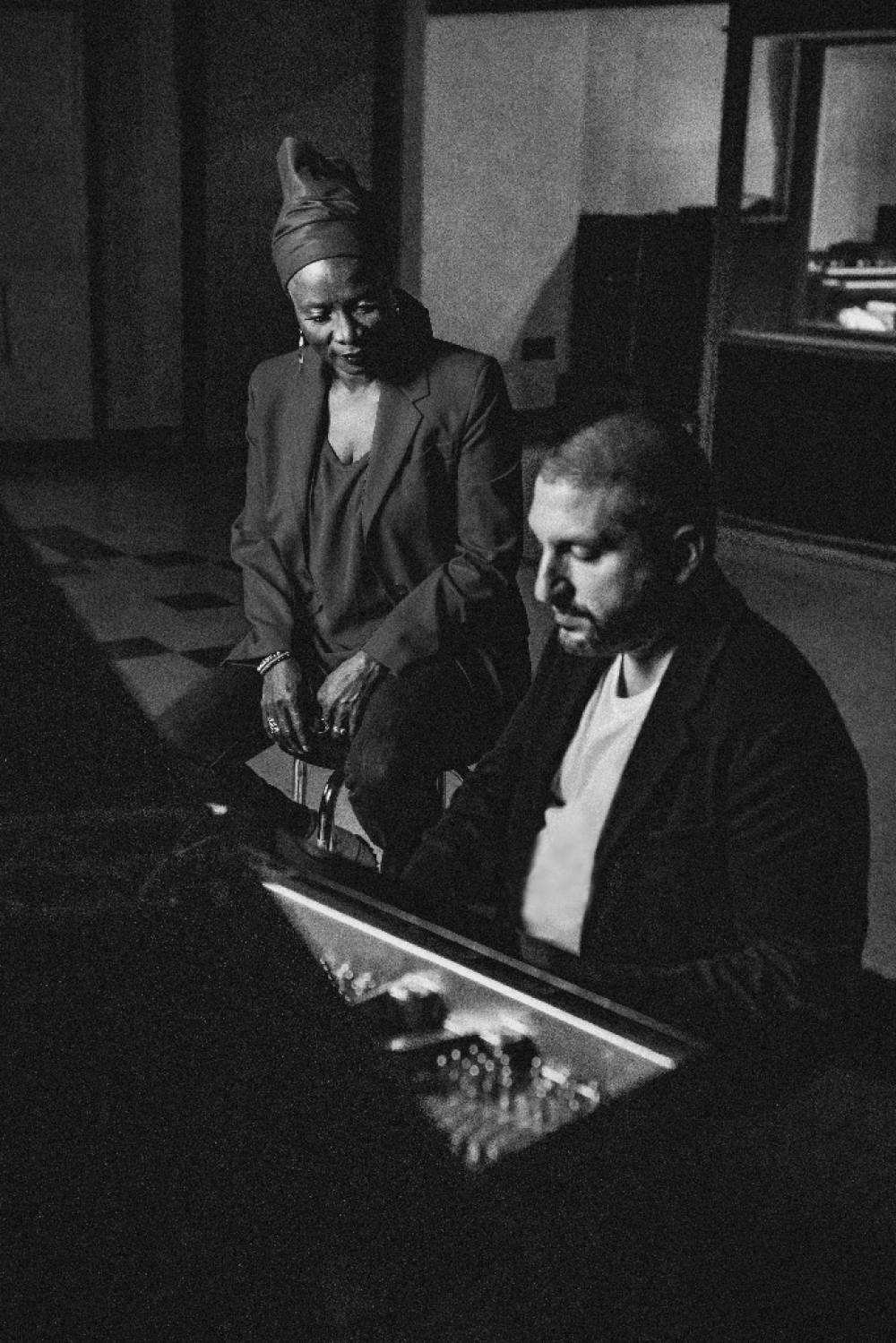
I find the rhythms fascinating. There's a lot of polyrhythm. All the parts are talking to each other. And your trumpet sound and Angelique's voice have this beautiful conversation. Angelique, I'm curious to know what it was you heard in Ibrahim’s sound or his music that made you want to work with him in the first place.
Angelique: You know what? I have met wonderful musicians all over the world. I've played on the stage with Wayne Shorter and people who are really talented. But there's talent, and then there's something on top of it. When you play an instrument, are you executing what you planned? Or are you talking through your instrument? It could be guitar. It could be drums. When you hear Ibrahim play the trumpet, you hear the trumpet, you hear a melody, but you also hear a voice. You hear a singer. You hear a complete musician, which is very rare to have. And I'm not saying this because he's here. This is what I felt the first time I heard him. After that I read an interview in which he said he would like to work with me.
And then a friend of mine out of the blue told me he was coming to New York. I didn't even know: Ibrahim Maalouf is coming to New York. I said, "Well, tomorrow I'm traveling, but today I'm here. I'm going.” Most of the time you don't see me much at concerts. I go only to concerts that mean a lot to me. So I arrived. I didn't know what to expect, and he starts playing and I'm like, "No way." I mean, trumpet players? We have trumpet players. Louis Armstrong. But this was good. So good. I thought, we’ve got to do something about it.
Ibrahim came to play with me at Carnegie Hall. You saw it. When I was asked by Carnegie Hall to do this show on November 5th, I said to myself, "I don't just want only vocalists. I want something else. I want two different instruments. I want piano and I want trumpet.” Then it became obvious Ibrahim was going to be part of this adventure, and Philip Glass was also going to be part of the adventure.
It's very difficult to perform at Carnegie. You know that place. It can be magnificent, or it can be the worst thing ever. So you have to have a balance with invited guests to balance the emotion, the musicality and everything. It's a roller coaster. It's storytelling. But I knew that when people heard Ibrahim playing at Carnegie Hall, they were going to go, “Oh s$#%!” And that's exactly what happened. “What in the world is that?” I've got you again!
That's lovely. I know what you mean about Ibrahim sounding like a voice. It's funny. Trumpet was the first instrument I ever wanted to play when I was six and seven years old. I was a big fan of Herb Alpert. And I've loved trumpet ever since, but I had the same experience when I heard you play, Ibrahim. There is something unique in the way you speak through that instrument. Not surprisingly, Angelique, you have excellent taste.
Ibrahim: If I can add something, what is amazing with Angelique is that more than being a great and amazing artist, she knows exactly how to let people around her shine. She knows how to bring them up and cheer them on, and to give them the space they need. Not every artist is so generous. Angelique is a world-class, A-list artists in the music world, and giving me this space in her set, and her program, and especially in a concert at Carnegie Hall, and many other opportunities where she made me meet her audience, is so generous, and so rare. Not many people have offered me such an opportunity. She's the biggest artist in the world with whom I've had the experience to play and who has given me the space. Salif Keita also, and Angelique, there are very, very few people who would be this generous. And that's because they are the biggest artists. Usually it's the biggest artist in this world who are the most generous.
At the Carnegie Hall concert, she basically said, "Take your time. Do your intro. Blow us away. Show the world what you know how to do." Before going on, I said, "Angelique, how much do you think I should play on the solo? One or two minutes?" And she said, “No, no, no, Ibrahim. Take your time. Just do it.” And I have to say that Jean also said exactly the same thing. That is so generous of you, Angelique and Jean.
A good call on their part. I really can't think of almost any artist who's done as many different things as Angelique. It's remarkable the way you keep the ideas constantly moving, but there's still that core of your statement, right from the beginning. I mean the funkiness of “Batonga” is in this album’s music.
Angelique: Gotta be funky. We like it funky, baby. Yes!
And then all the complexity of your jazz work, Ibrahim. I know only a couple of your albums, but I love them, and the two of you managed to bring all that together. It's an amazing marriage. But let's come back to the idea behind the project, this connection between the Middle East and Africa. That's a subject we have long been fascinated by at Afropop. But I think it has a particular relevance today. Do you have any thoughts about that? Aside from just being blown away by the musicality here, what do you hope people get out of this project?
Angelique: For me, as I, said before, and you know me from the get-go, it's about building bridges, and showing to people that we are not that different.
Ibrahim: I so much agree with this. We have the exact same philosophy, Angelique and me.
Angelique: It's terrible for people to just sit down and decide who has the right to be this or that. It's just fear of living. Because if you are comfortable in your body, you accept the fact that we are all different. Even twins have differences. But we set aside everything we know to be true, because we cannot live with the fact that somebody might teach us something we didn't know. For me, music is about education, opening people's minds, opening their hearts to see. I like to work with musicians from around the world, because I want people to know that I have different musical tastes. People should not put me in one box. I refuse to be in any box. For my whole career over the last 40 years, I refuse to be put in any box.
If I want to do jazz, I have to feel free to do it. I wanted to do classical music, so then I have to do it. For me, also, we tend to say Europeans here, Middle Easterners there, Muslims here… I’m like, “Stop! Stop!” We are just creating a problem that never existed.
Ibrahim: I totally agree. I think we both think about the world the same way, in terms of its richness. We are all similar because we are different. It's our differences that make us similar.
Our uniqueness.
Ibrahim: Yes. Uniqueness. I think Angelique and I have the same fear that is actually growing and growing these last years, which is that we are all witnessing, all of us, how much people react with adversity and violence when they face differences. It's crazy, and it’s growing and growing.
Angelique: Scary.
Ibrahim: Really scary. I'm witnessing this every day in Lebanon, in France…
Angelique: Everywhere.
Ibrahim: People are more and more scared. When they see a difference, they don't react with empathy, or in a welcoming way. They look at this as a threat. Why does it have to be like this? So basically in everything I do musically, and I know that Angelique is exactly the same, we intend, even if it's not always in a conscious way, we've always, always tried to prove through music that things that most people would think are not compatible, are in fact compatible. You know, a few years ago I produced an album on Umm Kulthum, the great Egyptian diva.
Yes, I love that album.
And everyone was telling me, "Why are you playing Umm Kulthum in a jazz way with New York musicians? Everybody was saying this, in the jazz world and in the Arab world. In the Arab world they were saying, "Don’t touch Umm Kulthum. You're going to harm the heritage of Umm Kulthum.” And in the jazz world, they were asking, "Why? What does Umm Kulthum have to do with jazz?"
Well, to start with, improvisation.
Yes. Improvisation. But there are so many other things. You know Arabic music was so much inspired by African culture, especially Egypt, which is the biggest Arab school of music, and it’s in Africa. In Africa you find the roots of blues and jazz and everything. We have so many common points of reference between American jazz and the Arabic cultures. And people don't want to see this for some political reason. In this geopolitical era that we are living in, most people think that there is nothing compatible between the Arab world and the jazz world.
Angelique: Even classical music. You talk about that so well, Ibrahim.
Ibrahim: Well, actually… Maybe Angelique knows what happened a few days ago. I was in an interview on a very big French program and they asked me why and how did I work to introduce a classical orchestra into African music. I looked at the guy who was asking me this, and I said, “But you know, classical music has been inspired a lot by African culture. So many things came from Africa, from North Africa, from Spain. Like the lute, which comes from the oud.” Well, you cannot imagine what happened to me on Twitter and social media.
Really?
Oh my God. You cannot imagine the reaction of xenophobic people everywhere.
This is why I don't look at Twitter.
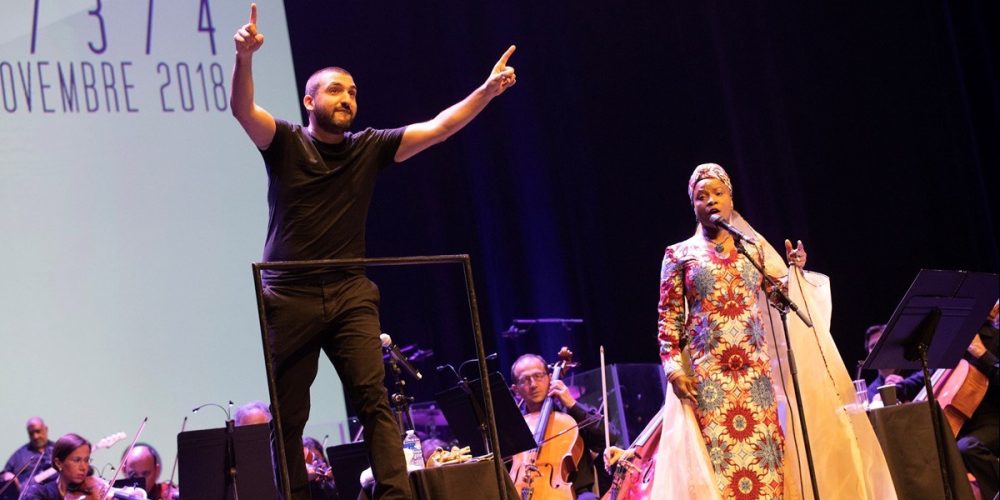
Angelique: With me, when the album came out, people are asking me, “You are Black. What are you doing with Arabic culture?" I received all this stuff. But you know what? I just discard them. I don't look at it.
You have to turn away. It's dangerous.
It's poison. That's the problem we have. This is why we do what we do, me and Ibrahim. But we live in it. When we leave our houses, we know that because of who we are, we are a danger to people who don't see what we have in common. It's a constant. It's a lifestyle we live in. I don't want to live in violence. I don't want to live to be bitter. I don't want to live to be angry. Music has allowed me to tell people, "Stop this nonsense." And we have to fight fake news. That's what's created all these things.
Ibrahim: And actually, if I can add something, we are saying all this with our hearts, talking from the heart. But even though we're just doing music – it’s just music, right? – we hope inside of us that this might affect people as much as it affects us. But it's only music. It's not so big. But when you see the negative reaction of people, how big the reaction is, this is what comforts me, what tells me that in the fact we are right. It touches people so badly, all those people who don't want anything like this to happen. They want a xenophobic world where everyone is about living in a separate area, and nobody mixes. They want this. The fact that we are doing what we are doing, which is only music-- it's just an album, just music, a concert-- the reaction that it provokes actually comforts me that we did the right thing.
Isn't it ironic that we live in a time when everyone can listen to everyone else. We have all these ways of connecting and checking each other out online and in so many ways. Information is more available than ever. But somehow the result is that we all silo off into our little tribes. I find this very strange. But I hear what you're saying about the reaction. You just have to take the heat and know that you're making a difference.
I also find it interesting what you said about classical music and Africa. We did a series a number of years back about the Musical Legacy of Al Andalus. It was so fascinating to learn all the changes that came out of that history. The violin, a bowed instrument: It didn't exist in Europe before the centuries of Al Andalus. It came through that history, from the east via north Africa. People don't know these things.
Angelique: Don't be saying that to the xenophobes. They'll be coming to your house.
Ibrahim: You should send me that. I'd be very interested to hear that.
I will do that. You know, Afropop started out in the late ‘80s just focusing on the music of Africa, but we soon realized that you can't draw that line, so we became Afropop Worldwide. As we say, music tells the story of the world.
Angelique: Music is our common history. It's our DNA. That's why it touches people when I'm singing in my language, nobody understands, but I still see people out there crying. They're coming to me and telling me this. That is the power that the xenophobes don't want to recognize. So then we change the narrative. When you talk about classical music, it touches them so much, because they have allowed classical music to be the music of the elite, the ones who are educated.
Ibrahim: And also, especially in Europe, there is this narrative that xenophobic people believe so much in, which is that classical European music is pure.
Angelique: (big laugh)
Handed down from God, right?
Ibrahim: Yes. It's something that they believe was created by European people and only European people. And then you have to explain to them that the oboe and the flute come from Asia. The timpani and the marimba come from Africa. The violin comes from the rebab. And on and on. But if you start explaining all this, it does not match their narrative. It's very, very difficult for them to accept these things.
I don't know if you've thought about touring with this project, but just out of curiosity, if you wanted to perform it, just the way this on this album, how many musicians would you need to put on the stage?
Ibrahim: It would be a big, big setup. That's why actually we’re not touring this right now, but we might hopefully do some concerts later. There's the string orchestra, the percussionists, plus my band. Six people, plus a chorus, three or four people like Angelique usually does. Then there would be maybe plus two or three trumpets. So, yeah, it would be a big, big thing, but not impossible.
I don't know if you heard this, Angelique, but our host Georges Collinet was recently kidding you on our airwaves about winning so many Grammy awards. But this one just might make the grade again. It's an extraordinary piece of work.
Angelique: It's already started again in Nigeria. "Angelique is getting another, blah, blah, blah…"
Well, those Nigerians are coming up fast. They have nothing to complain about. So again, my congratulations. I know I'll be enjoying this album all summer, and digging into those riddles. Thanks to both of you for taking time to speak with me. Ibrahim, I look forward to seeing you with your group. Do you have any plans to be in New York?
Ibrahim: Yes. We will be at Le Poisson Rouge on September 30.
I am marking my calendar now.
Angelique: I will be there. If I come, Jean will be talking to me about Ibrahim all night.
Ibrahim: (laughing) You are crazy, Angelique. I love you.
Thanks to you both. Ibrahim, enjoy your son’s first birthday.
Ibrahim: Thank you. It was very nice talking with you.
Angelique: Bye bye.
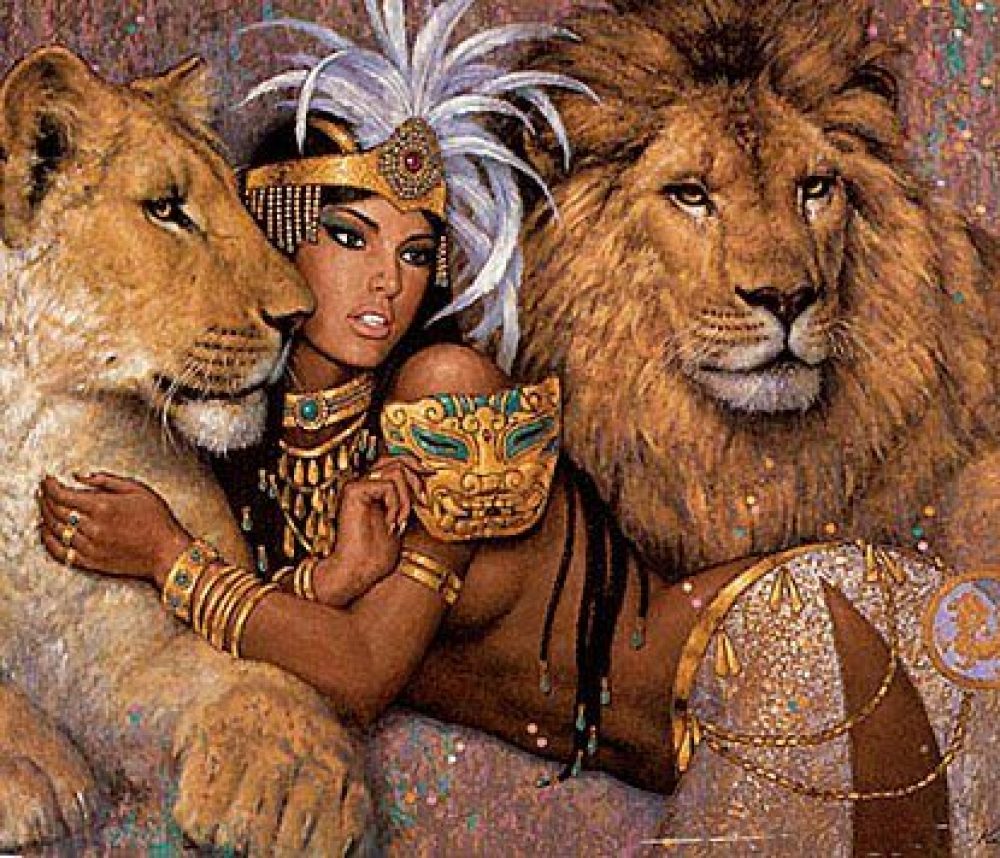
Related Audio Programs
